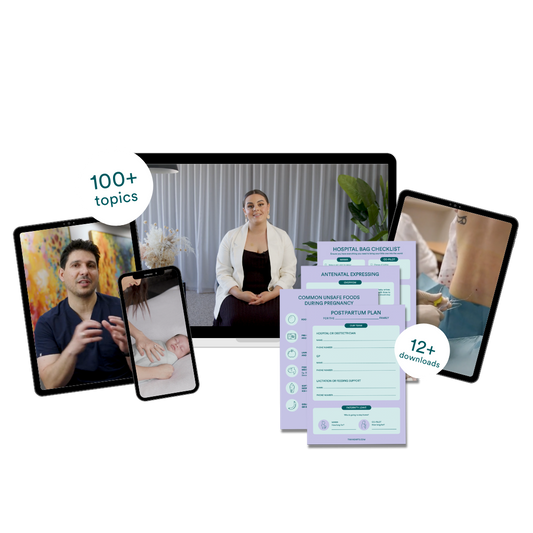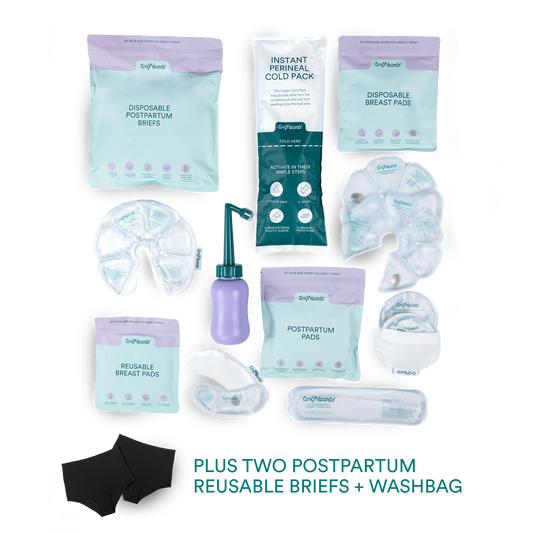Starting solids is an exciting but confusing milestone for you and your bub!
We know you have so many questions, but at the risk of overwhelming you, I've put together my top 10 tips to make the transition go as smoothly as possible.
1. Start feeding bub when they are ready
You will know your bub is ready to start eating solid foods when they begin displaying the following signs:
- They have good head and neck control and can sit upright when supported
- They show an interest in food - for example, they look at or reach out for your food
- They open their mouth when offered food on a spoon
- They have increased appetite, are feeding more often and want more breast milk or formula at the end of their feed
If your bub isn't displaying any of these signs or eating solids by 7-8 months, we recommend chatting to your child health nurse, doctor or dietitian.
2. The time of day really matters!
When starting solids with your bub, pick a time of day when they are not tired or overstimulated. An example of this would be after their first nap of the day. Get them up, offer their normal milk feed and then a small tablespoon of solids.
3. Don't get frustrated - your bub is learning a new skill!
It will be messy, they will play with their food, and they won't eat much, but this is 100% normal. Think of it as learning to snowboard, you're never going to be the fantastic the first time you try, and you'll likely spend more time on your bum than standing! It's essential to keep calm - it's meant to be a fun experience after all! Each time you try, your bub will become more confident.
4. Know your options for feeding your bub
There are three options you can consider when introducing solids to your little one:
- Baby-led weaning (BLW)
- Spoon feeding
- Or a mix of both!
Baby-led weaning
BLW is when your bub feeds themselves. If this is an option you'd like to try, offer your little one a selection of finger foods suitable for their age (I've listed some food recommendations in our 10th tip). This is where the all-important squish test comes in (check out tip 9) and will help to prevent choking.
Spoon Feeding
Spoon feeding is the traditional method and is when you feed your bub pureed foods like veggies, fruit and rice cereal before gradually progressing to mashed or chopped foods. This helps them to get used to the texture of solid foods. The best part about this method is that you can puree ahead of time and freeze them until you need them.
Or try them both!
Your third option is to use a mixture of both methods. Both methods have their pros and cons, but pick up on your bub's queues and what they're enjoying best!
5. Iron-rich foods are the KEY
Iron-rich foods should be fed to your baby at around six months of age. Iron-rich foods include:
- Iron-enriched baby cereals
- Meats, poultry and fish
- Well-cooked egg
-
Legumes like lentils and chickpeas
6. Avoid fussy eaters
As part of a healthy diet, aim to offer your baby a variety of foods from each food group. Just because you don't like it or they don't on the first try doesn't mean you don't offer it! Babies are learning to enjoy food and need variety to avoid becoming fussy.
7. Know the top allergy-causing foods and introduce these carefully
The most common allergenic foods are:
- Wheat
- Soy
- Peanut
- Fish and shellfish
- Sesame
- Tree nuts
- Egg
- Cow's milk
It's vital than you introduce these foods before your bub celebrates their first birthday. When introducing allergenic foods, introduce one at a time and only start to introduce allergenic foods into their diet once bub has had a few weeks, at least, of successful feeding.
Top tip: When introducing nuts, use nut flours or smoother butter or pastes.
8. Know what an allergy looks like
You must know what the signs and symptoms are of a mild, moderate and severe allergy before introducing allergenic foods.
Mild to moderate allergic reaction symptoms:
- Hives or welts
- Tingling in the mouth
- Swelling of the face and eyes
- Stomach pain, vomiting or diarrhoea (note: this is a sign of anaphylaxis in insect bites or stings)
Severe (anaphylaxis) allergic reaction symptoms:
- Difficult or noisy breathing
- Wheeze
- A persistent cough
- Swelling of the tongue
- Swelling or tightness in the throat
- Difficulty speaking or a hoarse voice
- Persistent dizziness
- Collapse or loss of consciousness
- Young children may be pale and floppy
- Pale and sweaty
- Abdominal pain, vomiting or diarrhoea, hives, welts or a rash (considered anaphylaxis when combined with any of the above symptoms)
If your bub shows any signs of an allergy, DO NOT feed them the food again, even if the reaction is mild. Seek medical advice.
We've also written a blog post on four mamas experiences with anaphylaxis so you can hear their stories and what reactions look like to educate yourself further. Click here to read.
9. Learn how to prepare food safely for your bub
When feeding your little one, you must stay with your child and watch them at all times. Some key food preparation tips include:
- Avoid giving hard pieces of food such as raw apple or carrot, whole or chopped nuts
- Instead, grate cook, puree or mash hard fruits and vegetables to avoid choking (a.k.a what we showed you in the squish test!)
- If you are BLW, suitable finger foods can include steamed veggies, roasted vegetable wedges, strips of meat, fish or chicken, bread or toast and crackers and soft fruits
An easy way of remembering if the food is okay to give to your bub - use the squish test. Pinch between your pointer finger and thumb, which mimics the pressure of a toothless little one's gums. If the food squishes easily, it's likely safe to give to bub. If it doesn't easily squish you need to cook, mash or grate it, so it becomes soft enough to pass the test.
10. Alright - you're ready! Here is what I started my baby on in the first month of introducing solids:
- Baby cereal
- Sweet potato
- Apple
- Banana
- Avocado
- Chicken
- Cheese
- Yoghurt
This was all prepared with the above recommendations, of course! I began introducing allergenic foods after he was feeding well for a month.
Some important thing to remember is:
- Do not add salt, sugar or other additives to your baby’s food.
- Dot not give them processed foods with fat, sugar and/or salt (e.g. cakes, biscuits, chips, fried foods)
- Fruit juice, cordial, soft drinks, flavoured water, unpasteurised milk, soy milk, goat’s milk, rice/oat milk, caffeinated drinks, tea, coffee and herbal drinks are not recommended for babies
- Avoid honey due to the risk of bacteria until 1-year-old
Best of luck! xo








